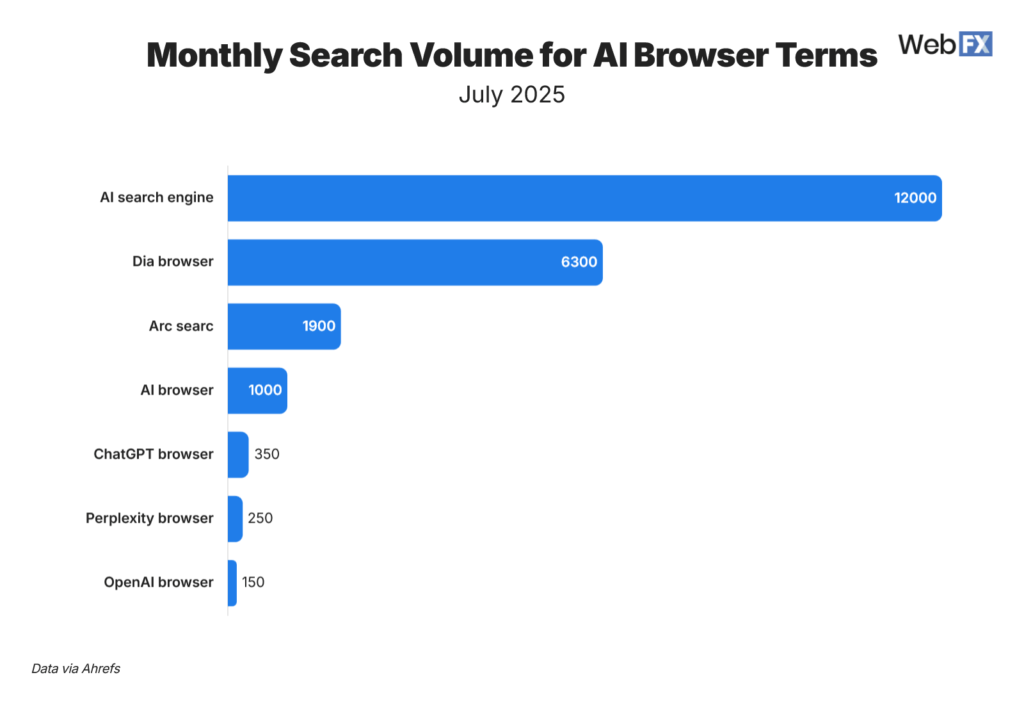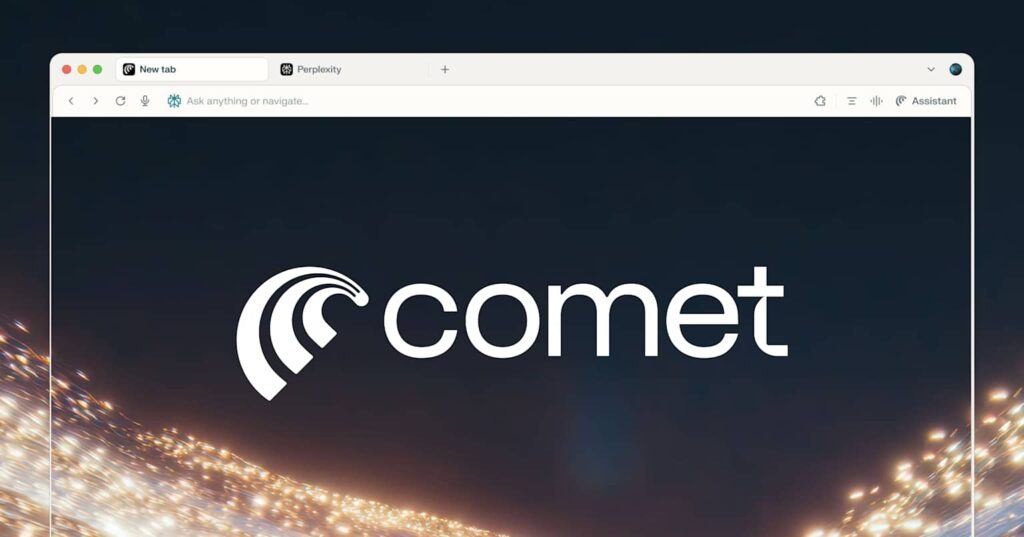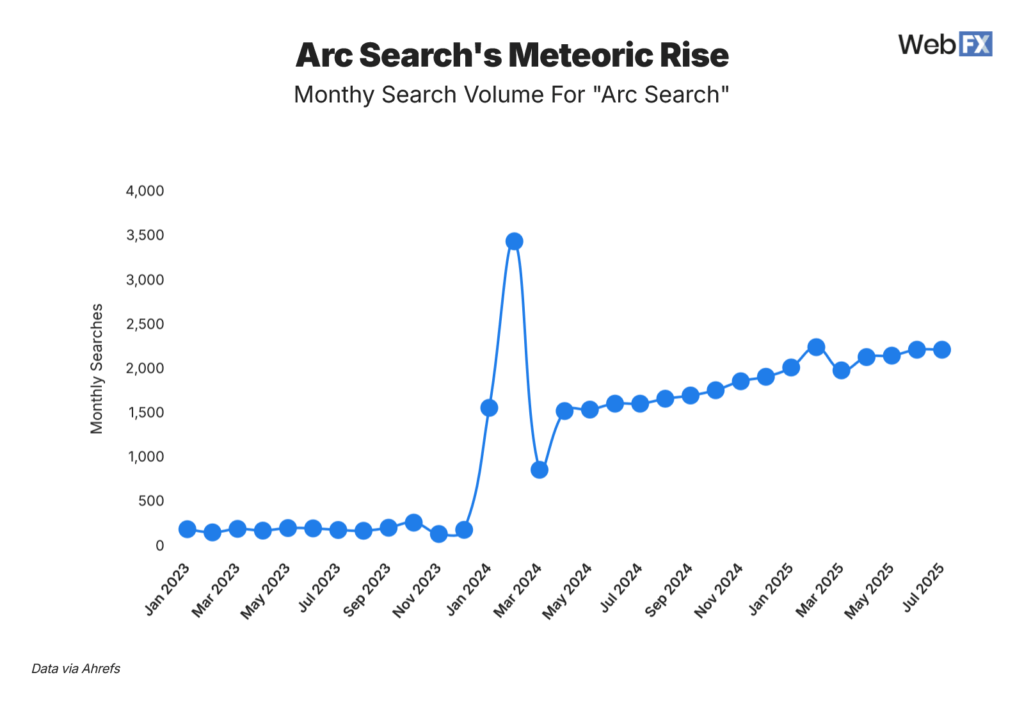-
 Published: Oct 24, 2025
Published: Oct 24, 2025
-
 11 min. read
11 min. read
-
Summarize in ChatGPT
-
 Trevin Shirey
Trevin Shirey VP of Marketing
VP of Marketing
- Trevin serves as the VP of Marketing at WebFX. He has worked on over 450 marketing campaigns and has been building websites for over 25 years. His work has been featured by Search Engine Land, USA Today, Fast Company and Inc. Read his review of working with WebFX for the last 15 years.
Table of Contents
- What makes AI browsers different (and why you should care)
- AI browsers reshaping the web
- Why AI browsers mark a massive shift for businesses
- The shift from traffic to transactions
- From search rankings to AI trust
- The end of the customer journey (as we know it)
- Context becomes everything
- Metrics get redefined
- Marketing actions to prepare for AI browsers
- The bottom line on AI browsers
- What AI browsers mean for SEO marketing? AI browsers are reshaping SEO marketing by turning the journey from “search → click → browse → convert” into “intent → action,” meaning businesses must move beyond ranking for traffic and focus on becoming trusted, structured, and action‑ready for AI systems.
- What are AI browsers and how do they differ from traditional browsers? AI browsers like Perplexity’s Comet, The Browser Company’s Dia, and OpenAI’s ChatGPT Atlas fundamentally change web interaction by completing tasks and providing direct answers instead of just taking users to websites—they compress the traditional search-click-browse-convert journey into a simple intent-to-action flow.
- How does Perplexity’s Comet browser work? Comet features an AI assistant that lives in the browser sidebar, can see everything you’re browsing, remembers your history, and automates routine tasks like summarizing emails, managing tabs, and navigating web pages—users can ask in plain English to find information or reopen specific tabs without hunting through dozens of open windows.
- Why should businesses care about AI browsers? AI browsers could complete transactions without users ever visiting your website—traditional metrics like click-through rate and time on site become irrelevant as success shifts to tracking brand mentions in AI responses, API calls, and completed transactions that bypass your homepage entirely.
- What actions should businesses take to prepare for AI browsers? Businesses should audit schema markup, create quick facts sections on service pages, test keyboard-only booking flows, write industry definition glossaries, set up AI referrer tracking in Google Analytics 4, add HowTo content with proper markup, and ensure contact forms work programmatically without JavaScript.
ChatGPT introduced AI through a simple chat window, but AI browsers are taking it further by embedding intelligent assistance directly into browsing. Unlike traditional browsers that show search results, AI browsers like Perplexity’s Comet, The Browser Company’s Dia, and OpenAI’s Atlas complete tasks, provide direct answers, and remember context.
They transform the user journey from “search → click → browse → convert” into “intent → action,” allowing AI to perform tasks without users visiting websites.
Understanding what AI browsers mean for SEO marketing is essential. Traditional metrics matter less, so structured data, clear schema, and actionable content are key—let’s explore the specific ways businesses can adapt to this new AI-driven web.
- What makes AI browsers different (and why you should care)
- AI browsers reshaping the web
- Why AI browsers mark a massive shift for businesses
- Marketing actions to prepare for AI browsers

What Makes AI Browsers Different (And Why You Should Care)
Let me show you the difference between traditional browsers and what’s coming:
| Traditional Browser | AI Browser |
| Takes you to websites | Completes tasks for you |
| Shows search results | Provides direct answers |
| Passive interface | Active assistant |
| You click through pages | AI navigates for you |
| Bookmarks save URLs | AI remembers context |
| Multiple tabs for research | One conversation for everything |
Think about that last row. It’s especially interesting if you have a serious tab problem like I do. Perplexity CEO Aravind Srinivas has already boasted about how Comet will beat Chrome when it comes to reopening old tabs, declaring that “Chrome is on its way out.”
On Comet, you can simply ask in English what you want it to reopen specifically.
No more hunting through 47 open tabs. Just ask: “What was that article about manufacturing efficiency I read last Tuesday?”
This is a small example but when AI is directly built into every aspect of the browser, it can transform how we browse online. Let’s take a deeper look at a few of the market leaders right now for AI browsers.
The Three AI Browsers Reshaping the Web
Perplexity’s Comet: Your Web Co-Pilot

Perplexity on Wednesday launched its first AI-powered web browser, called Comet. Currently available to Perplexity Max subscribers ($200/month), Comet represents a fundamental shift: instead of showing you links to click, it gives you answers and takes actions. Comet’s headline feature is Perplexity’s AI search engine, which is pre-installed and set as the default, putting the company’s core product — AI generated summaries of search results — front and center.
What makes it different: Users can access Comet Assistant, a new AI agent from Perplexity that lives in the web browser and aims to automate routine tasks. Perplexity says the assistant can summarize emails and calendar events, manage tabs, and navigate web pages on behalf of users. The sidebar assistant can see everything you’re browsing, remember your history, and help you complete tasks without switching contexts. On Comet, you can simply ask in English what you want it to reopen specifically. No more lost tabs or forgotten research.
Real business impact: Imagine a procurement manager saying “Find me three vendors for industrial sensors under $500 per unit with next-day shipping.” Comet doesn’t just search. It evaluates options and presents a comparison.
The Browser Company’s Dia: Ambient Intelligence
After Arc browser gained a devoted following among power users, The Browser Company launched Dia in early 2025 with a completely different approach: AI that works alongside you, not as a separate tool. Arc Search was one of the earlier AI-first browsers and after their mobile app launched in January 2024.

Now The Browser Company is already thinking bigger than Arc. The Browser Company CEO, Josh Miller, emphasized that Dia is more than just a browser. It represents a shift in how people engage with the web. Think of it as having an assistant that’s always present but never intrusive.
🎥Video: Dia browser
What makes it different: The real magic happens with autonomous actions: Dia doing actions on your behalf, like adding items from an email to your Amazon cart. Dia does it by browsing Amazon on its own, finding these items, and adding them to your cart. The Browser Company says it’s approaching this carefully… all your data is stored and encrypted on your computer.
Real business impact: Your B2B customers could forward a project requirements email to their browser and watch it automatically gather quotes from preferred vendors, including yours, if you’re optimized correctly.
ChatGPT Atlas: The Integration Platform
OpenAI has been busy. Not only are they likely launching ads soon, but OpenAI is also rolling out its own web browser: ChatGPT Atlas. Atlas positions itself as a formidable competitor to Google Chrome, and it offers the company greater control over data collection, which is central to its AI agent integration strategy.
What makes it different: OpenAI is in talks with Conde Nast, Eventbrite, Redfin, and Priceline to create specialized search features for travel, food, real estate, and retail websites. We are already seeing the first major iteration of this strategy through the Walmart and OpenAI partnership, which serves as a blueprint for how major retailers can use AI agents to capture sales directly within a chat interface.
This isn’t just about adding AI to browsing. It’s about creating deep, native integrations with the services people use daily. Atlas is engineered to maintain certain user interactions within a ChatGPT-style native chat interface rather than requiring users to navigate through traditional websites.
Essentially, Atlas will have ChatGPT follow along with you wherever you go on the web. It will offer assistance based on what it perceives you’re trying to do, and it will also learn as it goes, supposedly growing more helpful over time based on your past browser history. Atlas is meant to save you time by performing tasks for you while you browse.
Real business impact: Deep integrations mean Atlas can book appointments, schedule services, or complete purchases without users ever seeing your website.
Why AI Browsers Mark A Massive Shift for Businesses
Traditional web interactions follow a predictable path:
Search → Click → Browse → Convert.
AI browsers compress this into:
Intent → Action.
Let’s make this concrete with an example:
Traditional Browser Journey:
- User searches “HVAC maintenance near me”
- Clicks through 3-4 websites
- Compares services and prices
- Fills out a contact form
- Waits for callback
AI Browser Journey:
- User says “Schedule HVAC maintenance for next week”
- Browser checks their calendar, finds local providers, compares reviews
- Books appointment directly
- Adds to calendar with confirmation
Your website might never get a “visit,” but you could get the sale. Changes like this have huge impacts for businesses that rely on digital marketing.
The Shift from Traffic to Transactions
Traditional SEO focused on getting visitors to your site. AI browsers skip the visit entirely. The third demo is more ambitious: It shows the browser doing actions on your behalf, like adding items from an email to your Amazon cart. Dia does it by browsing Amazon on its own, finding these items, and adding them to your cart.
🎥Video: An early peek at Dia
What this means: Your business could make sales without anyone ever “visiting” your website. The browser becomes your sales channel.
From Search Rankings to AI Trust
Google (traditionally) shows 10 results and lets users choose. AI browsers make the choice for them. They need to trust your information enough to cite it or act on it.
What this means: Being #1 in Google matters less than being the source AI considers most authoritative and accurate.
The End of the Customer Journey (As We Know It)
We’ve spent years optimizing funnels: awareness → consideration → decision → action. AI browsers collapse this into a single interaction.
What this means: Your entire sales process needs to be accessible in one AI-readable package, not spread across multiple pages.
Context Becomes Everything
Perplexity’s on-browser AI agent can automatically see what I’m looking at, so I can simply ask it questions without needing to open a new window or copy and paste text or links. Think about that capability: the browser understands the full context of your browsing session. It knows what research you’ve been doing, what products you’ve viewed, what questions you’ve already asked. Perplexity CEO Aravind Srinivas has already boasted about how Comet will beat Chrome when it comes to reopening old tabs, declaring that “Chrome is on its way out.” On Comet, you can simply ask in English what you want it to reopen specifically.
What this means: AI browsers remember every interaction. Your content needs to work as part of a larger conversation, not just standalone pages. If someone researches “industrial HVAC systems” on Monday and returns Thursday asking about “installation costs for what we discussed,” the browser knows exactly what they mean. Your content strategy must account for these connected, contextual journeys.
Metrics Get Redefined
Click-through rate? Bounce rate? Time on site? These metrics assume someone visits your website. In an AI browser world, success looks completely different.
What this means: You’ll need to track brand mentions in AI responses, successful API calls, and completed transactions that never touched your homepage.
7 Specific Marketing Actions To Prepare For AI Browsers
1. Audit Your Schema Markup
Run your homepage through Google’s Rich Results Test. If you’re missing Organization, LocalBusiness, or Service schema, add it immediately. Structured data helps AI browsers understand who you are and what you do.
2. Create a “Quick Facts” Section
On your main service pages, add a bullet-point section at the top with:
- What you do
- Who you serve
- Key differentiators
- Pricing range
- Contact method
Format it clearly so AI can extract it easily.
3. Test Your Booking Flow
Try to book an appointment or request a quote using only your keyboard (no mouse, give that Tab key a workout). If it’s hard for you, it’s impossible for AI. Fix any form fields that don’t have proper labels.
4. Write 10 Industry Definitions
Create a simple glossary page. Define terms your customers search for. For example, a roofer might define “ice dam,” “flashing,” and “underlayment.” AI browsers use these to understand context. One way to help them is to use proper Schema markup on your page.
5. Set Up AI Referrer Tracking
In Google Analytics 4:
- Go to Explore → Create a new exploration
- Add “Session source/medium” as a dimension
- Create a segment where “Session source” contains “perplexity” OR “anthropic” OR “openai” OR “comet” OR “dia”
- Monitor this regularly to catch AI browser traffic as it arrives
6. Add HowTo Content & Markup
Pick your most common customer question. Write a step-by-step guide answering it. Use numbered lists and clear headings. Add HowTo schema markup to make it AI-friendly.
7. Create an API-Ready Contact Method
Even if you don’t have a full API, make sure your contact form:
- Works without JavaScript
- Has clear field labels
- Returns a confirmation message
- Can be submitted programmatically
Start with just one of these. The point isn’t to be perfect — it’s to be more prepared than your competitors when AI browser traffic starts flowing.
The Bottom Line on AI Browsers
AI browsers could represent the biggest shift in web interaction since smartphones. They’re not just changing how people search. They’re changing how people interact with the entire internet. Think of ChatGPT as an early wave to an incoming tsunami.
The businesses that win in this new battleground will be those who understand that visibility now means being useful to AI, not just ranking in search results.
While your competitors debate whether this matters, early adopters are already optimizing for Comet, preparing for ChatGPT Atlas, and testing strategies for Dia. The web is evolving from a place you visit to an intelligence that works for you.
The question isn’t whether AI browsers will change your industry. It’s whether you’ll be ready when your customers start using them.
-
 Trevin serves as the VP of Marketing at WebFX. He has worked on over 450 marketing campaigns and has been building websites for over 25 years. His work has been featured by Search Engine Land, USA Today, Fast Company and Inc. Read his review of working with WebFX for the last 15 years.
Trevin serves as the VP of Marketing at WebFX. He has worked on over 450 marketing campaigns and has been building websites for over 25 years. His work has been featured by Search Engine Land, USA Today, Fast Company and Inc. Read his review of working with WebFX for the last 15 years. -

WebFX is a full-service marketing agency with 1,100+ client reviews and a 4.9-star rating on Clutch! Find out how our expert team and revenue-accelerating tech can drive results for you! Learn more
Try our free Marketing Calculator
Craft a tailored online marketing strategy! Utilize our free Internet marketing calculator for a custom plan based on your location, reach, timeframe, and budget.
Plan Your Marketing Budget
Table of Contents
- What makes AI browsers different (and why you should care)
- AI browsers reshaping the web
- Why AI browsers mark a massive shift for businesses
- The shift from traffic to transactions
- From search rankings to AI trust
- The end of the customer journey (as we know it)
- Context becomes everything
- Metrics get redefined
- Marketing actions to prepare for AI browsers
- The bottom line on AI browsers

See AI Marketing in Action
Explore how WebFX helped a regional brand get discovered in AI search experiences — proving what’s possible with today’s AI-driven marketing!

Proven Marketing Strategies
Try our free Marketing Calculator
Craft a tailored online marketing strategy! Utilize our free Internet marketing calculator for a custom plan based on your location, reach, timeframe, and budget.
Plan Your Marketing Budget
What to read next




